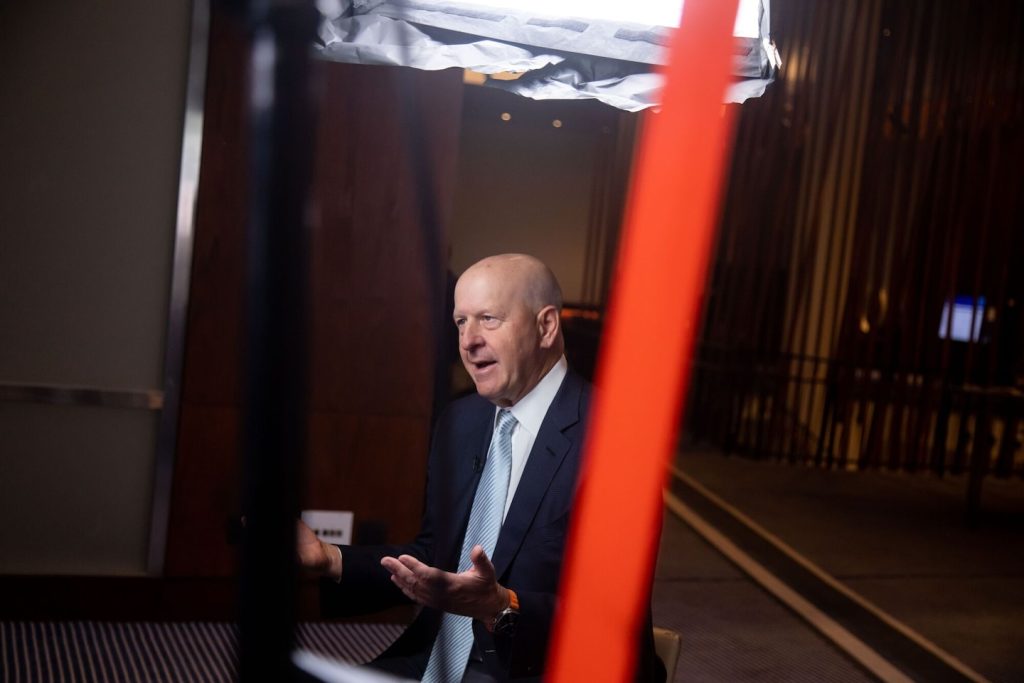Solomon can relieve his bankers’ irritations by liberally applying the traditional Wall Street salve of cash. The obstacle is the heavy cost of undoing Goldman’s big push into consumer banking.
At Goldman, it has always been OK to take risks that go bad, so long as there were strategies in place to limit the losses and get out quickly. Solomon’s greatest sin isn’t being too gruff, his DJ side hustle, or personal use of company planes — the recurring themes of his bad press. In fact, it was leading Goldman into a big bet with no easy exit or downside protection.
When the bank laid out plans for Marcus consumer-banking arm and its credit-card business with partners like Apple Inc. during Goldman’s first-ever investor day in January 2020, it was candid about losses it would take early on. But these were meant to peak at about $1 billion pretax in 2020 with the consumer businesses and transaction banking moving into profit from 2023 onwards.
By the end of last year, when Solomon had been convinced to reverse much of his consumer ambition, the pretax losses over the three years 2020-2022 totaled $3.8 billion. So far this year, it has lost another $1.2 billion in the Platform Solutions division created for consumer and transaction banking.
Goldman is now exploring a sale of GreenSky, the home-improvement lending business that it bought for $1.75 billion not even two years ago, around the peak of fintech company valuations. There is a fair chance it might take further losses on that sale even after it recently wrote off half of the goodwill booked on the purchase.
By my reckoning, Goldman’s adventures in consumer-land are already close to being as costly as the fines and disgorgements it paid for its role in the Malaysian government-linked 1MDB corruption scandal, which led to Goldman’s top executives having their bonuses slashed for 2020.
The consumer-related losses aren’t as clear-cut as the 1MDB fines, to be fair. Some could be reduced if the economy improves and Goldman can release provisions put aside against bad debt in its remaining consumer loans. It might also be able to sell its mass market advisory business, formerly called United Capital, for more than the $750 million it paid to acquire the firm in 2019.
Goldman would also argue that the technology it built for credit cards and checking accounts has value, so the investment, which contributed to the losses, wasn’t a complete waste. The deposits it has gathered in consumer and transaction banking have also lowered its funding costs and brought other benefits.
By the end of the year, reversing course might be less painful financially. A pickup in dealmaking and capital markets work, replenishing bonus pots, could help quiet dissent, even as Goldman cracks down on staff who are being stubborn about turning up to the office full time. If not, Solomon will have to make some hard decisions about whether he can pay bankers more at the expense of shareholder returns.
Money talks, as they say. In investment banking, lack of money complains bitterly about the CEO.
More From Bloomberg Opinion:
• Goldman’s Solomon Hasn’t Hit Rock Bottom Yet: Paul J. Davies
• Matt Levine’s Money Stuff: Everyone Wants a Piece of Sculptor
• Corporate Jets Have No Place at the Beach: Brooke Sutherland
This column does not necessarily reflect the opinion of the editorial board or Bloomberg LP and its owners.
Paul J. Davies is a Bloomberg Opinion columnist covering banking and finance. Previously, he was a reporter for the Wall Street Journal and the Financial Times.
More stories like this are available on bloomberg.com/opinion
Read the full article here














